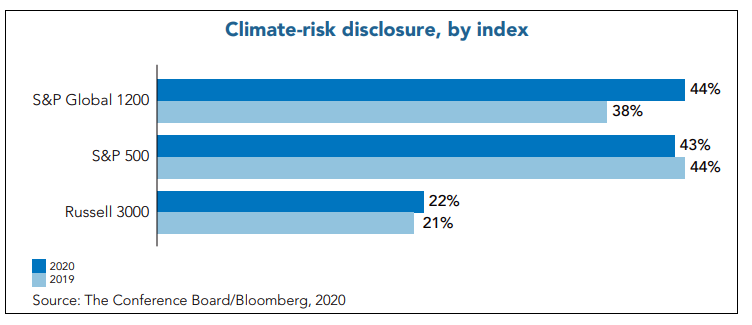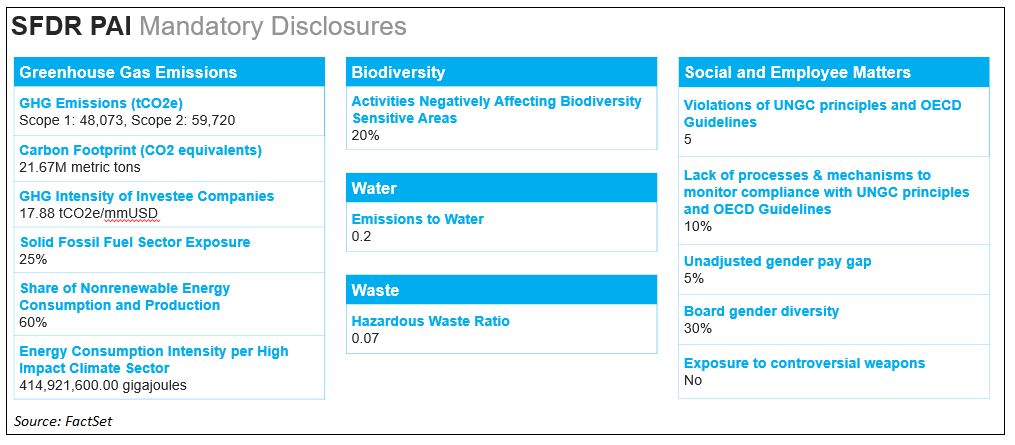For decades, the voluntary nature of corporate environmental, social, and governance (ESG) reporting has been a primary challenge in the ESG data industry. Carbon reporting by companies—and the lack thereof—is a bellwether for ESG reporting in general. Years of work by sustainable investment organizations have laid the groundwork for clear, standardized requirements and yielded patchy reporting.
But the sustainable reporting landscape will change dramatically in the next 12 months as U.S. and European Union (EU) regulators are poised to lend new regulatory heft to reporting guidelines.
Carbon reporting offers a window into the larger challenge. It's been a long-time project of standards organizations: prodding companies to reveal their carbon footprint in comparable numbers. The leading Greenhouse Gas Protocol for corporations was established in 2001. Since then, the Sustainability Accounting Standards Board (SASB), the Climate Disclosure Project (CDP), the Global Reporting Initiative (GRI), and the Task Force on Climate-Related Financial Disclosures (TCFD) have pushed standards outlining how companies should report on carbon emissions, with most of them using harmonized metrics and methodologies.
Still, while more than 9,500 companies reported emissions to the non-profit CDP in 2020, most companies did not. According to an article by Columbia professor Shivaram Rajgopal writing in Forbes, as of June 2021, “only 20% of publicly listed U.S. companies voluntarily disclose emissions data.” As a result, data providers are forced to either fill in values, penalize non-reporters, or leave certain data points blank if companies don't provide them. This leads to ESG data products that are inaccurate when it comes to carbon emissions as well as other ESG factors.
This situation mirrors the larger corporate sustainability challenge beyond just carbon. The Conference Board reports that climate-risk disclosures are increasing globally and for the Russell 3000, with a small step backward for S&P 500 firms.

However, this logjam of corporate disinterest in reporting carbon emissions (or in standardized sustainability metrics) is threatened by regulators on both sides of the Atlantic.
European Regulatory Regime
As shown in the graphic below, the European Union’s ESG regulatory disclosure regime is comprised of the Taxonomy Regulation, the Non-Financial Reporting Directive (NFRD), and the Sustainable Finance Disclosure Regulation (SFDR).

Under the NFRD, large EU public corporates must disclose their “non-financial” ESG performance alongside their financial performance. An in-process rule will extend those requirements to an even larger group. Not only must individual companies meet these reporting requirements in Europe, but asset managers will soon need to make disclosures of principle adverse impacts (PAIs). The requirements are slowly rolling out, beginning with the largest participants in financial markets.
PAIs will establish regulatory baselines for disclosures in the areas of greenhouse gas emissions, biodiversity, water, waste, and social and employee matters.

Forthcoming U.S. Regulations
In July 2021, Gary Gensler, chairman of the U.S. Securities and Exchange Commission (SEC), indicated that a new rule proposal is coming by year-end 2021 and “quantitative disclosures could include metrics related to greenhouse gas emissions, financial impacts of climate change, and progress towards climate-related goals.” Gensler added that the SEC is considering asking companies to report on partner firms in their supply chain, an added level of disclosure known in climate circles as “Scope 3” emissions.
Wide-Ranging Impact
This U.S.-European regulatory pincer movement will squeeze non-reporters. It will pressure companies to adopt standardized metrics—not only for carbon emissions, but for a range of other environmental metrics that are included in planned EU regulations and contemplated by U.S. regulators.
For investors, these new regulations offer the best opportunity to date for transparent peer comparison and screening; both are basic activities that will establish new levels of demand from investors for company equity and debt.
Certainly, mandated disclosures won’t eliminate greenwashing. Auditing systems for carbon reporting aren’t clearly laid out yet. However, auditing of sustainability data is on the rise as well, per the 2020 KPMG Survey of Sustainability Reporting. In this survey, 71% of the top 250 companies globally (i.e., the "G250") had sustainability reports plus auditors. For a group of 5,200 companies that are in the top 100 in each of 52 different countries (i.e., the "N100"), it was 51%.
By December 2021, investors will know the details of a massively significant SEC proposal and they'll be only six months away from the first EU SFDR-required reporting.
Mandatory climate disclosures are coming. Companies and investors alike must prepare for it.
